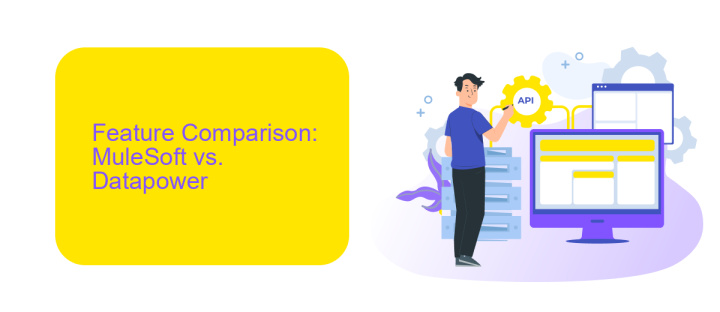MuleSoft Vs Datapower
In the rapidly evolving landscape of enterprise integration, choosing the right middleware platform is crucial for seamless data flow and operational efficiency. This article delves into a comparative analysis of MuleSoft and IBM DataPower, two leading solutions in the integration space. We will explore their features, performance, and use cases to help you determine which platform best suits your organization's needs.
MuleSoft Vs Datapower: Platform Overview
MuleSoft and DataPower are two prominent platforms used for integration and API management. MuleSoft offers a comprehensive integration platform that allows businesses to connect applications, data, and devices both on-premises and in the cloud. DataPower, on the other hand, is known for its robust security and gateway functionalities, primarily used to secure, control, and optimize access to APIs and services.
- MuleSoft: Known for its Anypoint Platform, which provides a unified solution for API management, design, and development.
- DataPower: IBM's solution focused on providing secure API gateways, with strong emphasis on security policies and traffic management.
- ApiX-Drive: A versatile tool that can be used in conjunction with these platforms to automate and streamline integration processes across various services and applications.
While MuleSoft excels in offering a unified, flexible integration platform, DataPower stands out with its emphasis on security and control. The choice between the two often depends on the specific needs of the organization, such as the importance of security versus the need for a flexible, all-in-one integration solution. Tools like ApiX-Drive can further enhance the integration capabilities of both platforms by simplifying the automation of workflows and data synchronization.
Feature Comparison: MuleSoft vs. Datapower

MuleSoft and Datapower are both powerful tools for integration, but they offer distinct features that cater to different needs. MuleSoft provides a comprehensive platform for building application networks with its Anypoint Platform. It supports a wide range of connectors and pre-built APIs, making it easier to integrate various systems. MuleSoft's design center allows for the creation of APIs and integrations in a user-friendly interface, making it accessible for both developers and non-developers. Additionally, MuleSoft offers robust analytics and monitoring capabilities to ensure optimal performance and security.
On the other hand, Datapower, a product by IBM, is focused on providing secure and high-performance integration solutions. It excels in handling complex security requirements and offers extensive support for various security protocols. Datapower is particularly strong in API management and gateway functionalities, ensuring secure and efficient data flow. For businesses looking for a versatile integration solution, ApiX-Drive can be a valuable addition, offering easy setup and management of integrations without extensive coding. While MuleSoft emphasizes ease of use and broad connectivity, Datapower prioritizes security and performance, making the choice dependent on specific business needs.
Use Cases: MuleSoft and Datapower in Action

MuleSoft and Datapower are both powerful tools for enterprise integration, each with unique strengths tailored to different use cases. MuleSoft excels in API management and connectivity, making it ideal for organizations looking to streamline their digital transformation efforts. Datapower, on the other hand, is known for its robust security features and is often used in scenarios requiring stringent security protocols.
- API Management: MuleSoft's Anypoint Platform allows for seamless API creation, management, and monitoring, making it a go-to for businesses needing efficient API lifecycle management.
- Security: Datapower provides advanced security features such as XML threat protection, encryption, and authentication, making it suitable for industries like finance and healthcare.
- Integration: Both MuleSoft and Datapower can be integrated with third-party services like ApiX-Drive, which simplifies the process of connecting various applications and automating workflows.
In conclusion, the choice between MuleSoft and Datapower largely depends on the specific needs of your organization. MuleSoft is ideal for robust API management and connectivity, while Datapower excels in providing top-notch security features. Utilizing services like ApiX-Drive can further enhance the capabilities of both platforms, ensuring seamless and secure integrations.
Architectural Considerations: Building Integration Architectures

When designing integration architectures, it is crucial to consider the specific needs and constraints of your organization. MuleSoft and DataPower offer distinct approaches, each with its own strengths. MuleSoft provides a comprehensive platform for API-led connectivity, facilitating seamless integration across various systems. DataPower, on the other hand, excels in security and high-performance processing, making it ideal for environments with stringent security requirements.
Incorporating tools like ApiX-Drive can further streamline the integration process. ApiX-Drive offers a user-friendly interface for connecting different applications without extensive coding, making it a valuable addition to your integration toolkit. This can be particularly beneficial for organizations looking to reduce the complexity of their integration landscape.
- Evaluate the specific integration requirements of your organization.
- Consider the strengths and weaknesses of MuleSoft and DataPower.
- Leverage tools like ApiX-Drive for simplified integration processes.
- Ensure that security and performance needs are adequately addressed.
Ultimately, the choice between MuleSoft and DataPower should be guided by your organization’s unique needs. By carefully evaluating your requirements and leveraging complementary tools, you can build a robust and efficient integration architecture.
Choosing the Right Integration Platform: MuleSoft vs. Datapower
Choosing the right integration platform between MuleSoft and Datapower depends on your specific business needs. MuleSoft offers a comprehensive suite for API management, providing extensive support for various protocols and data formats. It excels in cloud-based integrations and is highly scalable, making it suitable for organizations looking to connect a wide array of applications and services. Additionally, tools like ApiX-Drive can further simplify the integration process by automating data transfer between different systems without requiring deep technical knowledge.
On the other hand, Datapower is known for its robust security features and is often favored by enterprises that prioritize secure, on-premises integrations. It provides excellent support for XML and web services, making it a strong choice for organizations with legacy systems. However, its complexity might require specialized skills for effective implementation. Ultimately, the decision should be based on the specific integration requirements, existing infrastructure, and long-term scalability goals of your organization.
FAQ
What are the key differences between MuleSoft and DataPower?
Which is better for API management, MuleSoft or DataPower?
Can MuleSoft and DataPower be used together?
What are the deployment options for MuleSoft and DataPower?
How can I automate and integrate MuleSoft or DataPower with other systems?
Time is the most valuable resource for business today. Almost half of it is wasted on routine tasks. Your employees are constantly forced to perform monotonous tasks that are difficult to classify as important and specialized. You can leave everything as it is by hiring additional employees, or you can automate most of the business processes using the ApiX-Drive online connector to get rid of unnecessary time and money expenses once and for all. The choice is yours!

